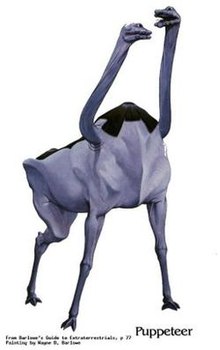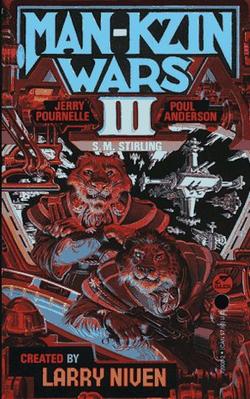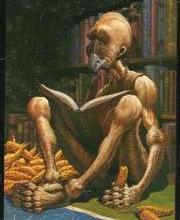Known Space: Part 1
Jun 28, 2024
Part 1: Known Space - How I Came To Love It
I have a soft spot in my heart for the Known Space setting by Larry Niven, I started reading them when I was a young teenager and was voraciously reading all the sci fi and fantasy I could get my hands on. I consumed books at a rate that frankly boggles my mind when I think about it now. I developed a taste for genre novels because they were cheap from the used bookstore and I was exposed to lots of awesome sci fi and fantasy: David Eddings - The Belgariad and The Mallorean, Ursula K. Le Guin - Earthsea, Anne McCaffrey - Dragonriders of Pern, the Dragonlance novels, Orson Scott Card - Ender's Game, Frank Herbert - Dune, Kim Stanley Robinson - Mars Trilogy, the Star Wars Extended Universe novels... I read anything and everything I could get my hands on, frequently even starting in the middle of various series.
We happened to have a few of the Known Space books at home so I read the Tales of Known Space and Neutron Star anthologies, multiple volumes in the Man-Kzin Wars and Ringworld. Something about the books just clicked with me, even despite Niven's formula. When you read a book or short story of his the characters are generally authoritarian and evil if they're the antagonist, or that very Heinleinian sort of libertarian trickster/ultimate boy scout character that is skilled at everything and always gets the upper hand via their wits when they're the protagonist. Action tends to be rote and while not glossed over it is delivered in a perfunctory way. If there are romances or sex scenes they're delivered in the awkward kind of way that only a sci-fi writer from the '70s can really manage. Now I know I'm really selling it here but hear me out: He does two things well.
Aliens that are actually alien.
In the Known Space novels you have the Kzin which are functionally anthropomorphic space tigers, and largely are similar to Klingons in Star Trek: patriarchal society, obsession with honor despite all of them being lying and thieving bastard cats, a stratified society where class becomes something of an obsession. But there's nuance there - Telepaths are required for the Kzinti empire to work, but also reviled, and are frequently sympathetic PoV characters. The Kzinti enslave other races and have complex relationships with them. They've undergone extreme natural selection after multiple wars with Humans that have not gone their way. They're interesting. My cat totally thinks she's a Kzin. They're the epitome of the all vibes no thoughts kind of alien, just instead of good vibes it's bloodshed and mayhem.
Then you have the Puppeteers which are herd animals. Herbivores with an innate cowardice that borders on pathological. They're such cowards that the only Puppeteers ever seen by other species are deemed insane by Puppeteer society, generally portrayed as a sort of extreme, over the top bipolar disorder or a sort of very fictional, hysterical schizophrenia. They're also absolutely evil (from an outside perspective, rationally self interested from their own perspective - those libertarian vibes again.) and will murder countless other sophonts in a bid to keep themselves safe. With their advanced technology they effectively power the economy of Known Space. Yes, the pathologically cowardly race are merchant-traders extraordinaire. What better way to spy on your enemies?

Lastly you have the Pak which are effectively humans... well sort of. I'm going to skip the fine details here - read Protector if you want the whole story - but the Pak are a race that live in the core of the galaxy. Earth was a failed colony. It failed because the Pak live a two stage life cycle; the first stage is the "breeder" stage where they're born, grow up, and breed. Shocker. The second stage is the "protector" stage. They'll eat a plant that turns them into sexless (in a biological, no gender, no sex organs sense), insanely intelligent, biological death dealing machines that have the sole purpose of protecting their descendants from any threat. The plant they need to turn into protectors failed to thrive on Earth, and we know their breeders as "Homo Habilis". Yep, that's right, we're aliens. Checkmate evolved-on-earthists! And yes - modern humans exposed to this plant can still turn into Protectors. This becomes something of a theme.
Okay so those are the main players, there are other, weirder aliens and backstories and stuff but you get the idea.
Big Ideas
The second thing he does well is the "Big Dumb Object" or the "Big Idea". That's why you read his books. Ringworld is the Ur example of this. Take the orbit of earth. Make it a ring of material a million miles wide, and almost six hundred million miles in circumference. This is similar in concept to a Dyson Sphere, and leaves you with a surface area of about three million times the earth's surface. Or think Halo, but way, way bigger. Damn. That's big. A big dumb object. Ringworld as a novel literally spends something like 15% of its length marveling over the technical feat it would be to create something like that.
End
So, why am I writing about this? Well I recently started reading and re-reading two of his series: The Fleet of Worlds series concerning the Puppeteers and their special Big Dumb Object and the Ringworld series concerning... well the Ringworld and it has made me want to write about some things.
- I think Fleet of Worlds does things with worldbuilding and the infilling of lore to already established stories/timelines that works, and some stuff that doesn't work.
- I have some observations about the requirement that all books be part of a potentially infinite series, or at least a trilquadpentalogy, and how not new that is.
- And last, I read these novels as a teen. I was a politically conscious teen to say the least, and still am as an adult but I was surprised at how much I ignored the fairly obvious politics of Niven's Known Space series, and in fact of a LOT of sci fi I consumed in my youth - don't worry this isn't really about my political opinions it's just observations on his and maybe some musings on why it flew over my head as a teen.
I'm envisoning this as a multi part series.
- Part 1: is this post, Hi!
- Part 2: the Fleet of Worlds series through book 4,
- Part 3: talking about what I love about the Known Space series
- Part 4: Ringworld series through book 4
- Part 5: The politics of Niven and some of his contemporaries
- Part 6: Book 5 of both series and my conclusion
Assuming I don't forget about my grand plans. We'll see! Hit the feed buttons on the Blog Page to add me to your RSS feed!



